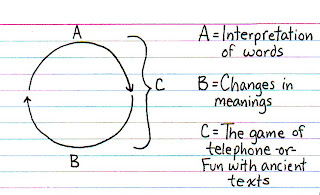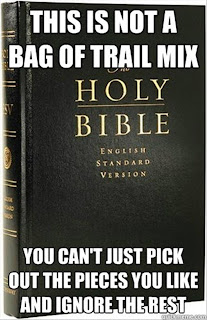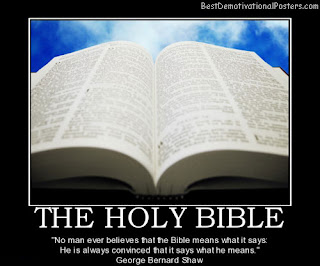This is the first venture I can recall that opened my eyes
to the other areas of the Bible. It isn’t all about loving your neighbor; quite
a bit of it in fact details how to punish your neighbors for various crimes. I became
curious about what other information lurked within the revered iconic pages and
made a brave decision: to read the Bible myself.
An Unexpected Journey
 |
| Photo source: www.tumblr.com |
I made my way through the beginning of Genesis (no pun
intended) but couldn’t get much further. The old-time style of writing was too
hard to make sense of at eleven years old, not to mention the fact that the
long lists of lineages were downright dull. I was content to wait until I was
older to try again, and trust in the sermons of others in the meantime.
I attempted again as a teenager in high school thinking, “if
I can understand Shakespeare and Jane Austen, I can get through the Bible!”
Sadly, I yet again didn’t make it very far. I was still confused with not just
the wording, but the meaning as well.
"Why does God seem so different when looking at the Old and New Testaments?""Was I interpreting everything correctly?""Should I stop eating “unclean” meats?""Do I really need to kill people who work on Sundays (Exodus 35:2)?""Was I not a good enough Christian to instinctively just KNOW what the take home message was?"
I felt like I just wasn’t getting it, but instead of talking
about my uncertainties with others I kept my thoughts to myself. I didn’t want
to be the one heathen who couldn’t wrap her mind around it. So many people I
respected revered the Bible; I must be doing something wrong. Since I was
scared of getting the interpretation wrong, I relied on others’ interpretations.
I found that I often wasn’t a fan…
“All Human Knowledge Takes The Form of Interpretation” – Walter Benjamin
Do you remember playing the telephone game when you were
little? After whispering a sentence in one person’s ear, the line had to be
relayed through the entire group, more often than not coming out humorously
twisted into a different sentence entirely in the end. This is how I’ve come to
roughly equate passing on Biblical interpretations over time.
 |
| Photo source: www.patheos.com |
As the biblical scriptures were passed down, they were changed
by personal modifications and translational inferences. The Bible is just one
big book of interpretation. Reading about the Bible’s origins helped bring this
to light for me, and with that things started to make more sense. I was finally
able to read the Bible without shorting a fuse in my brain.
As I discussed in my previous entry, the Bible is not the
literal word of God but a conglomeration of human writings that should be taken
for what they are: personal accounts and opinions of the authors that are filled
with their own personal partialities, prejudices, and biases. The Bible, like any
other great literary work, should be open to personal interpretation and
inquiry. It’s not a black and white list
of what to do and what not to do. It’s not even a law book, or a guide to
morality; there are too many contradictions and atrocious acts condoned within
its pages to accept it as such. It was written by human beings, and none of us
are by any means perfect. Therefore, the Bible is not perfect.
That being said, I believe everyone is entitled to their own
opinion when reading the Bible. It’s when people start using the Bible as a
means of divine justification for their hateful actions and prejudices that I
have a problem. Many hate-inspired interpretations of the Bible are centered on
the individual; they make one person feel better about themselves and their
lifestyle, which gives them a sense of superiority over others. It’s our
actions towards others which determine whether or not we’re a good person: not our
race, gender, sexual orientation, ethnicity, or whether or not we eat bacon (Deuteronomy 14:8). People need to realize that they can't just pick and choose which prejudices they should follow in the bible. Anyone who uses the Bible to condemn homosexuality (Leviticus 18:22) should also forbid wearing composite clothing (Leviticus 19:19).
 |
| Photo source: www.dumpaday.com |
My respect for the Bible, though it has changed in form from
iconic reverence to intellectual curiosity, remains to this day. I no longer
consider the Bible to be the answer to all life’s questions, but I still find
it to be one of the most influential and complex books in the history of
mankind.







